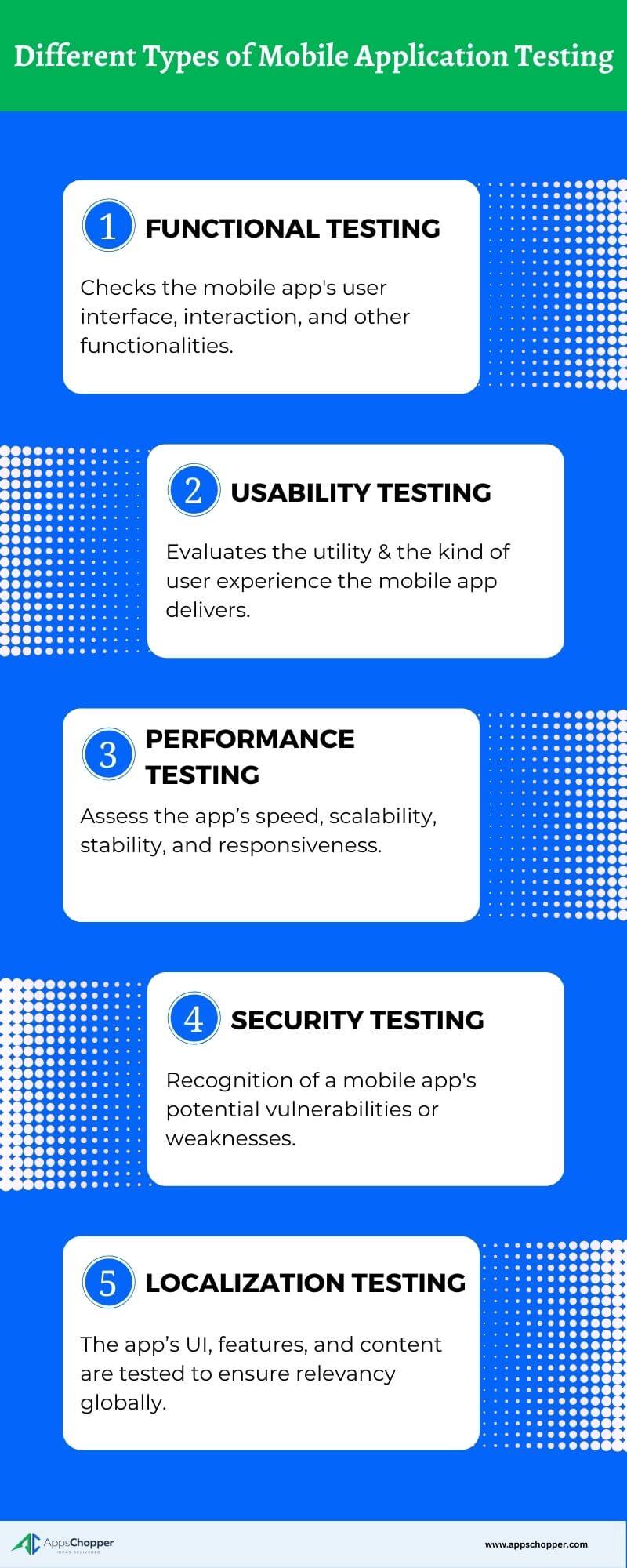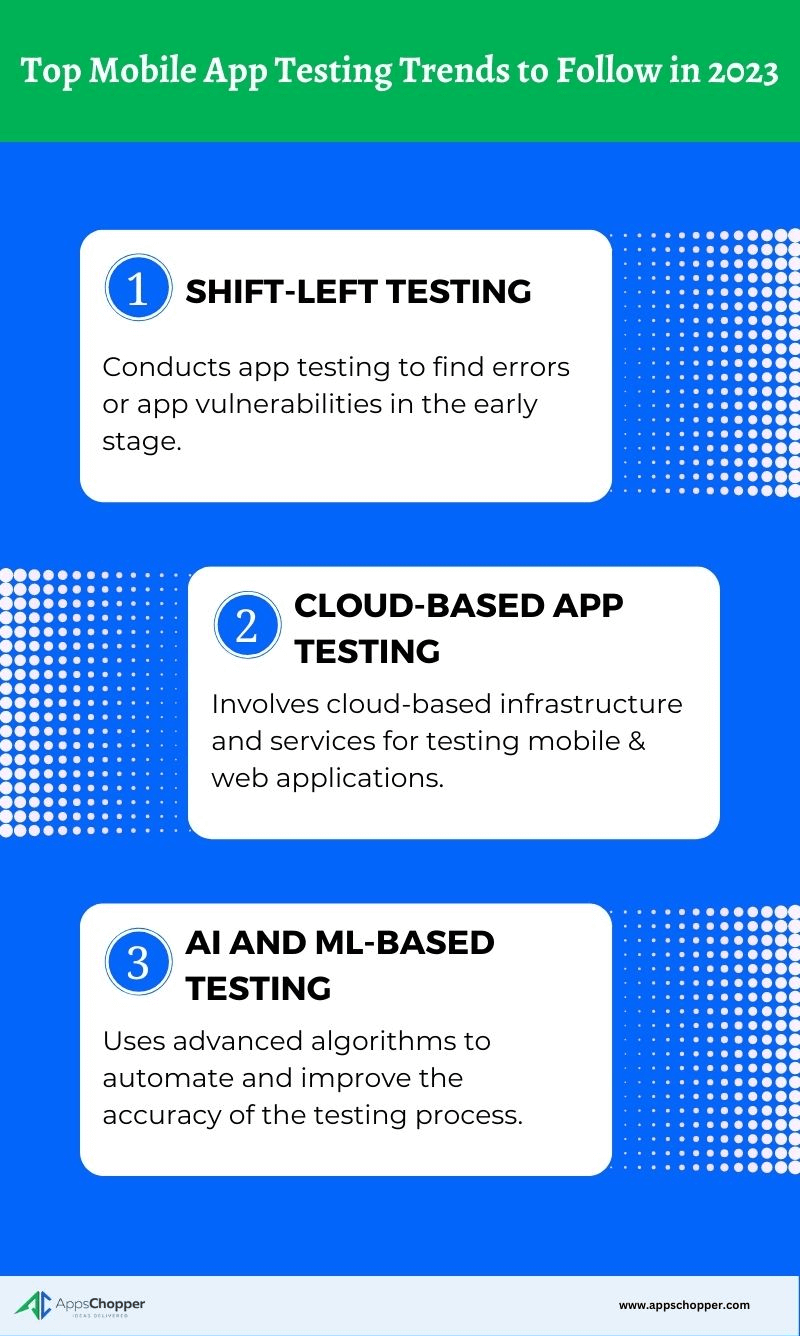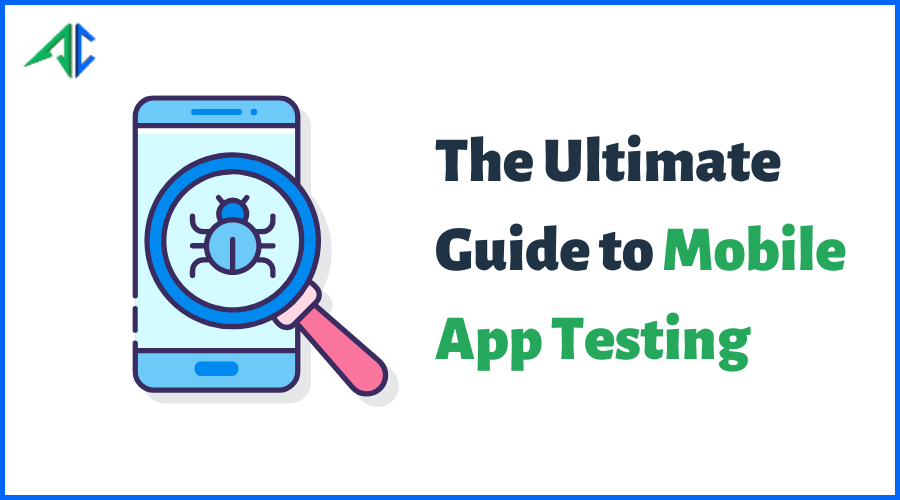Table of Contents
In the early days of mobile devices, the app testing process used to be very simple, as most apps were built on a single platform. It was mostly done manually by the QA team to ensure compatibility.
Everything started to change with time!
App testing has become more advanced and important than ever. Mobile app testing tools and frameworks, like Selenium or Appium, came into existence. As a result, the QA team can easily test the app across a wide range of configurations to ensure that app is error-free.
Mobile application testing is the topmost priority of business owners to ensure their app performs as intended and is well-protected against cyber threats. Mobile devices will continue to evolve, and we can expect testing to become more advanced.
In this blog, we will talk about the importance, types, and latest mobile app testing trends.
Without further ado, let’s begin.
Why Do You Need Mobile App Testing?
Have you ever used a mobile app that didn’t work as expected? Or it stopped working in between the usage and take forever to get loaded? Well, these kinds of situations can be a bit frustrating, leading to a higher bounce rate.
That is when mobile application testing comes in!
Testing your mobile app before launching the final version is mandatory because it identifies potential issues. Later, it optimizes the app’s usability, functionality, and performance.
A mobile app testing company will ensure your app is well-protected & compatible with multiple devices, operating systems, and network conditions. It means the user will have a smooth user experience irrespective of the device s/he owns.
The secondary reason for conducting app testing is security. For instance, hotel booking or any banking app holds a user’s private data. Mobile application security testing will make sure the app meets security standards and maintains privacy.
Altogether, application testing is crucial in delivering a positive experience and ensuring the app’s success. It will help maintain the user’s trust, leading to increased customer satisfaction and higher ROI.
Different Types of Mobile Application Testing

-
Functional Testing
This testing aims to ensure the mobile app is working as intended. It checks that all the features & functionalities of the app are working effectively. You can avail of the functional testing services to check the mobile app’s user interface, interaction, and other functionalities.
For instance, if you own a ride-booking app, the QA team will ensure the app accurately displays drivers’ details and real-time booking status. Functionality testing identifies defects in the app and assures the app will meet user requirements.
-
Usability Testing
Next up, we have is usability testing.
As the term implies, mobile app usability testing evaluates the utility & the kind of user experience it is delivering. It involves collecting feedback from users through surveys or interviews. As a result, usability testing helps make informed decisions on improving the app’s quality.
For example, if you want to develop an eCommerce app, conduct usability testing. It will help you ensure that the users can navigate and make purchases on the app easily. Companies like Airbnb, IBM, or Etsy conducted usability testing and witnessed huge growth.
-
Performance Testing
Mobile app performance testing is another software test that evaluates the app’s speed, scalability, stability, and responsiveness. With the help of performance testing, you can ensure your mobile app can handle high traffic volumes. Moreover, it will take care of user interaction without slowing down your app.
You plan to develop a banking application and want to ensure the app can handle multiple users & transactions without any issues. Performance testing will play an important role here. It will ensure the app can manage high traffic and usage loads. The testing will provide better app performance and deliver a smooth user experience.
-
Security Testing
“Security concerns every business owner when it comes to developing a high-performing mobile app. Why? Because it will protect your app from malicious activities or threats.”
This is when mobile application security testing comes into the picture. The QA team recognizes a mobile app’s potential vulnerabilities or weaknesses. They accordingly provide recommendations to strengthen security. The penetration testing involves simulating various cyber-attack scenarios to ensure the data is well-protected.
If we talk about the healthcare industry, securing the patient’s data from unauthorized access or any potential cyber-attacks is essential. The security testing company will address all the possible attacks that may result in data loss. They will implement two-factor authentication and data encryption to prevent the user’s personal information.
-
Localization Testing
Localization testing is another type of mobile app testing that can ensure the mobile application is adaptable globally. The app’s user interface, features (or functionalities), and content are tested to ensure relevancy across different languages & regions. The testing can result in a lower bounce rate and deliver a smooth user experience.
Localization testing ensures that the content available in the hotel booking app is available in all languages. It complies with local regulations & standards. For example, the app will display pricing in local currency, local taxes or fees, etc.
Top Mobile App Testing Trends to Follow in 2023
As mentioned above, mobile application testing trends will become more advanced. Being a business owner, you must stay updated with the ongoing trends.
So, let’s look at mobile app testing trends in 2023.

-
Shift-Left Testing
Testers test the app to identify the issues or bugs in the initial stage only. As a result, it reduces the cost of fixing the bugs in later stages. It is a powerful approach because it emphasizes early and continuous testing throughout the development cycle.
In essence, shift-left testing is about taking a proactive approach to software testing, addressing the issues before they become more complex. With the help of this testing, entrepreneurs can expect a high-quality app with a speedy development process. Ultimately delivering more value to their target audience.
-
Cloud-Based App Testing
Cloud-based app testing does not require the need for physical devices. It is an approach that involves cloud-based infrastructure and services for testing mobile & web applications. It enables testers to execute their test cases on a wide range of devices and operating systems.
The testing environment of cloud-based apps is accessed via a web browser. The QA team uses various tools & frameworks to automate their tests and generate reports. Additionally, cloud-based testing eliminates the need for maintaining a large inventory of physical devices, which can be expensive and time-consuming.
-
AI and ML-Based Testing
AI and ML-based testing tools are becoming popular as they identify patterns in the app’s behavior that humans might miss. In simpler terms, these testing approaches use advanced algorithms to automate and improve the accuracy of the testing process. This approach helps in improving the overall quality of the app and reducing the testing time.
One of the significant advantages of AI and ML-based testing is its ability to reduce the time & cost of testing while improving the overall quality of the application. By automating the testing process, the QA team can perform tests more quickly and accurately as compared to manual testing.
Mobile Application Testing Process
-
A Proper Planning
Before beginning the app testing, the QA team should adequately define the testing strategies, objectives, and timeline. The initial phase generally involves identifying testing types, such as functional, performance, usability, and security testing.
The testing team should also define the testing approach; for instance, whether they will go with manual or automated testing. They should also determine the scope of testing, referring to the features, functionalities, and use cases during the app testing.
-
Test Case Development
After defining the testing strategies, it is time to define the test cases that will be developed based on the requirements. It is essential to cover all the possible scenarios, like edge cases and negative situations, leading to comprehensive testing.
Not all test cases are equally important, so the testing team should prioritize the test cases based on the app’s functionality. High-priority test cases should first be executed to identify critical errors and avoid app failure.
-
Test Environment Setup
Here comes the critical step in the testing process!
It involves creating a testing environment that accurately simulates the real-world conditions in which the application will be used. A well-designed test environment can help to identify issues and improve the quality of the application.
The testing environment may require various tools, such as automated, performance, and security testing tools. These tools should be configured to work correctly in the testing environment and to provide accurate results.
-
Retesting and Regression Testing
Retesting is the process of running the failed test cases again after the defects have been fixed. It aims to verify that the issues identified during the initial testing have been resolved and the application is functioning as expected. Retesting is typically performed before the application is released for further testing.
Regression testing, on the other hand, is the application testing process. It looks after any changes have been made to the code or environment. Regression testing ensures that the existing functionality has not been impacted.
Both the testing aims to ensure the application is thoroughly tested and issues have been resolved before launching the final version.
-
Acceptance Testing
Acceptance testing is the final stage in the app testing process. It tests the application with end-users to ensure it meets their requirements and expectations. Acceptance testing is typically performed by a group of end-users or stakeholders representing the application’s intended audience.
By performing acceptance testing, the development team can ensure that the application is easy to use & navigate and is accessible to all users. It reduces the risk of post-release issues.
Factors Affecting the Mobile App Testing Cost
-
Type of Testing
The type of testing required for the application is the first factor that can impact the app testing cost. For example, functional testing may be less expensive than performance or security testing. Do you know why? Because these types of testing require more advanced tools and expertise.
-
App Size and Complexity
The size and complexity of the application can also affect the cost of app testing. Larger and more complex applications may require more time and resources to test, which can increase the overall cost of testing.
-
Number of Platforms and Devices
The number of devices & platforms on which the application needs to be tested can also affect the cost of app testing. Testing on multiple devices and platforms requires more time and resources, which can increase the overall cost of testing.
Similarly, many more factors exist, like the testing methodology timeline or the tester’s location, impacting the overall cost of app testing.
Concluding Thoughts
The world of mobile app testing is constantly evolving, and businesses must stay up-to-date with the latest trends & best practices to deliver high-quality applications. It can help organizations improve their testing processes and ultimately provide better products. From AI and ML-based testing to cloud-based testing, there are several innovative approaches for testing a mobile app.
To ensure success in mobile app testing in 2023 and beyond, businesses must invest in the right mobile app development services to suit their unique needs. By doing so, they can deliver more value to their customers and gain a competitive advantage in today’s fast-paced digital landscape.
Frequently Asked Questions
- What is mobile app testing, and why is it important in 2023?
Mobile app testing is the process of verifying the functionality, usability, and performance to ensure they meet the end-user’s expectations. It is essential in 2023 because mobile apps continue to evolve and become more complex. As a result, testing is critical to delivering high-quality applications to users.
- Is it necessary to test my mobile app on multiple devices and platforms?
Yes, testing your mobile app on multiple devices and platforms is necessary as it ensures that it works correctly across different configurations & operating systems.
- How long does mobile app testing take?
The duration of mobile app testing can vary depending on various factors, such as the complexity of the application, the number of features to be tested, and the type of testing being conducted. Typically, mobile app testing can take anywhere from a few days to a few weeks, depending on the scope of testing and the strategy being used.







